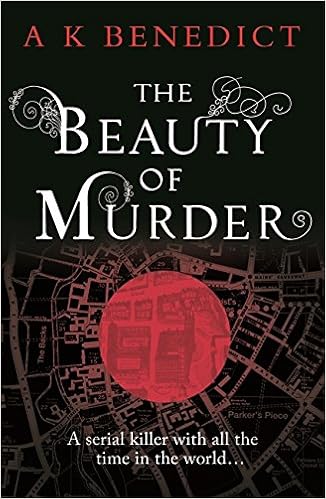'I feel more alive standing next to something dead. Don't you?' [p. 57]Stephen Killigan, newly arrived philosophy lecturer at a Cambridge college, stumbles home one drunken evening via the kebab van on Market Hill, and discovers a corpse. Unfortunately, when he leads the police to it, it's no longer there.
This does not do his career any good. Nor does it endear him to Inspector Jane Horne -- even before another impossible corpse (this one recently disinterred) turns up in the Fellows' Garden of Killigan's college. Killigan, who is aware that this all looks highly suspicious, turns for help to his friend Satnam, and to librarian Lana Carver. He also gets to know Robert Sachs, an academic with an interest in the aesthetics of death, and meets the eccentric Iris Burton, who gives him a copy of her book on time travel.
The Beauty of Murder captures Cambridge's ambience: the way the stone walls sometimes seem to emanate cold, the dankness of the fens, the plague pit underneath the bus station, the bohemian roughness of Mill Road. (I am not altogether convinced that 'a lecturer from the University of East Anglia' inscribed the words Reality Checkpoint on the lamppost at the centre of Parker's Piece, given that UEA is 65 miles away in Norwich. Perhaps Benedict means Anglia Ruskin?)
Killigan is a charismatic and witty narrator: a former goth, tattooed, prone to melancholy memories of his drowning mother. He becomes less likeable later in the novel, but I think that's simply that the plot ensnares him -- both in terms of the character becoming mired in unpredictable and acausal events, and of the author focussing more on those events, and on the other characters, than on Killigan's interior life.
I also liked Jane Horne a great deal: indomitable, prickly, secretive, and unwilling to tolerate stupidity.
Benedict's writing is gorgeous, full of lovely turns of phrase and surprising metaphors. Even when Killigan's being a tad pretentious ('a library is a sanctuary, a paper city where the emotionally homeless can find haven between the pages') his part of the narrative is interesting, and when he's less epigrammatic his turn of phrase is a delight.

No comments:
Post a Comment